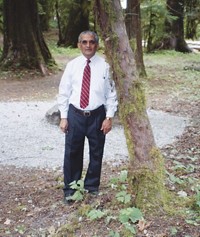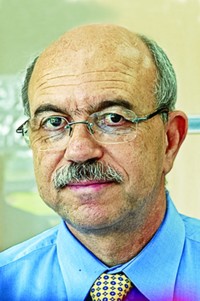Advertisement
Grab your lab coat. Let's get started
Welcome!
Welcome!
Create an account below to get 6 C&EN articles per month, receive newsletters and more - all free.
It seems this is your first time logging in online. Please enter the following information to continue.
As an ACS member you automatically get access to this site. All we need is few more details to create your reading experience.
Not you? Sign in with a different account.
Not you? Sign in with a different account.
ERROR 1
ERROR 1
ERROR 2
ERROR 2
ERROR 2
ERROR 2
ERROR 2
Password and Confirm password must match.
If you have an ACS member number, please enter it here so we can link this account to your membership. (optional)
ERROR 2
ACS values your privacy. By submitting your information, you are gaining access to C&EN and subscribing to our weekly newsletter. We use the information you provide to make your reading experience better, and we will never sell your data to third party members.
People
Ernest Guenther Award In The Chemistry Of Natural Products
Recipients are honored for contributions of major significance to chemistry
by Sarah Everts
January 14, 2008
| A version of this story appeared in
Volume 86, Issue 2
Sponsored by Givaudan
Having a plant species named after you is a rare tribute, but David G. I. Kingston has been twice honored in this way. Adding to these accolades, the Virginia Polytechnic Institute & State University professor is this year's award recipient.
Kingston, 69, was born in Croydon, a suburb of London. Honing his chemistry skills as a young boy by building explosives that he field-tested in the nearby countryside, Kingston became interested in natural products chemistry as an undergraduate student at Cambridge University.
In particular, Nobel Laureate and chemistry professor at Cambridge Alexander Lord Todd first piqued Kingston's interest in natural products with his lectures about how the structure of cholesterol that was initially reported had been debunked. As time went on, Kingston says, he also found the long-term goals of natural product chemistry—finding therapies in the natural world and contributing to human health—aligned with his Christian faith.
After receiving a Ph.D. from Cambridge, Kingston eventually landed a tenured position in the chemistry department at Virginia Tech. He also served 15 years as an associate editor at the Journal of Natural Products.
Kingston is best known for his systematic study of the behemoth molecule paclitaxel, marketed by Bristol-Myers Squibb as Taxol. He has "investigated almost every functional group on the taxane ring system for its effect on the drug's activity," says Virginia Tech colleague Joseph S. Merola.
"Those advances have provided some excellent insights into the taxane structure-activity relationship and required overcoming some challenging synthetic hurdles," adds George R. Pettit, a medicinal chemist at Arizona State University.
Kingston and his collaborators also identified the correct binding conformation of paclitaxel with the protein tubulin, which provides insight about how the drug seizes the machinery of rapidly dividing cancer cells. From this work, he has developed and patented paclitaxel analogs that enhance this association.
Kingston also isolated more than 200 bioactive natural products from the forest and coral reefs of Suriname and Madagascar, as a project leader of the International Cooperative Biodiversity Groups (ICBG) program funded by the Fogarty International Center. Kingston's work also provided part of the justification for establishing the Central Suriname Nature Reserve, which protects 1.6 million hectares of forest, Merola notes.
"The productivity of David's ICBG program, in some of the least hospitable parts of the planet for scientific research, is nothing short of remarkable. Its success is a tribute to his insight, perseverance, and belief in the importance of natural product research," adds Jon Clardy, a biological chemist at Harvard University.
A former ICBG collaborator, James Miller, now dean and vice president of science at the New York Botanical Garden, named a tree found in Peru and Ecuador Cordia kingstoniana after Kingston, while Richard Spjut, a plant collector with World Botanical Associates, named a new yew tree—the genus that bequeathed paclitaxel—found in China, Taxus kingstonii.
Kingston was also the recipient of the 1999 Research Achievement Award given by the American Society of Pharmacognosy and the 2002 winner of the Outstanding Scientist of Virginia award.
The award address will be presented before the Division of Organic Chemistry.





Join the conversation
Contact the reporter
Submit a Letter to the Editor for publication
Engage with us on Twitter